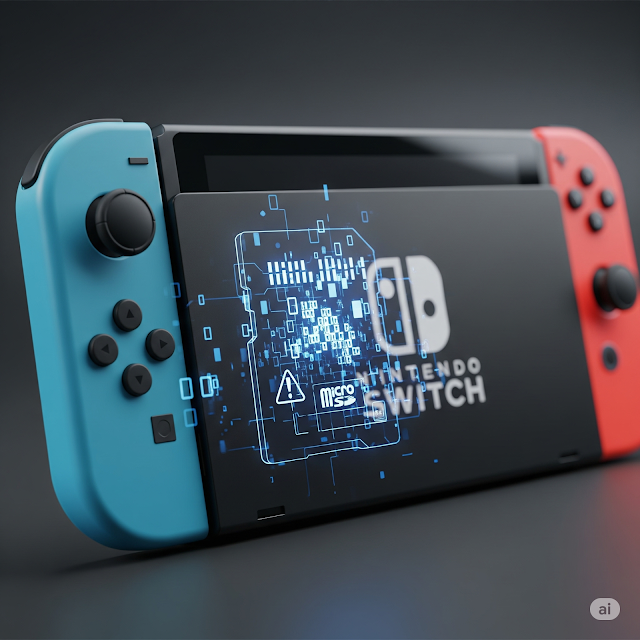Nintendo Switch 2: Could exFAT Limitations Hold Back Nintendo's Next Console?
6/27/2025Nintendo Switch 2: Could exFAT Limitations Hold Back Nintendo's Next Console?
As anticipation builds for the rumored Nintendo Switch 2, discussions around its potential hardware capabilities are abundant. However, a less flashy but equally critical aspect has surfaced: speculation that the console could be held back by software limitations, particularly its continued reliance on the exFAT file system for external storage. This choice, carried over from the original Switch, raises questions about performance, data integrity, and how Nintendo's next-generation console will handle the ever-increasing size and complexity of modern games.
Key Concern: While exFAT offers broad compatibility and large file support, its lack of advanced features like journaling and its reported instability on the current Switch could create bottlenecks and user frustrations on the more powerful Switch 2.
Understanding exFAT: A Double-Edged Sword
Developed by Microsoft, exFAT (Extended File Allocation Table) was designed to be a lightweight file system optimized for flash drives, overcoming the 4GB single-file size limit of its predecessor, FAT32. This makes it ideal for removable storage like SD cards, allowing for large game downloads and multimedia files. Its widespread compatibility across various operating systems and devices (including modern game consoles like PlayStation and Xbox) is a major advantage for Nintendo, simplifying external storage use for consumers.
However, exFAT comes with notable drawbacks compared to more robust, modern file systems like NTFS (used primarily by Windows) or ext4 (common in Linux). Crucially, exFAT lacks journaling, a feature that logs changes to the file system before they are committed. This journaling capability dramatically reduces the risk of data corruption during power outages, crashes, or improper shutdowns. Without it, exFAT is more susceptible to data loss or corruption, particularly on devices that are frequently put into sleep mode or powered off quickly.
The Current Switch's exFAT Woes
On the existing Nintendo Switch, users have reported anecdotal cases of SD card corruption, often attributed to the exFAT file system. While some users report no issues, others caution against it, leading many to stick with FAT32 despite its 4GB file size limitation. Experts suggest that the problem might lie not just with exFAT itself, but with Nintendo's specific implementation or drivers, which some have described as "shoddy."
Adding to the concern, even when using exFAT, the current Switch has been observed to unnecessarily "split" game files larger than 4GB into multiple segments. This file-splitting, a workaround for FAT32's limitations, is redundant on exFAT and can lead to less efficient data management, potentially impacting game loading times and overall performance, especially with very large titles.
Implications for the Nintendo Switch 2
The Nintendo Switch 2 is expected to feature more powerful hardware, larger internal storage, and potentially faster microSD Express card support, which can offer speeds comparable to some SSDs. However, if it continues to use exFAT without significant improvements to its underlying drivers and management, several issues could arise:
- Performance Bottlenecks: Even with faster SD cards, an inefficient file system can negate some of those speed benefits, leading to longer load times or stuttering in demanding games. The constant file-splitting could exacerbate this.
- Data Integrity Risks: The lack of journaling in exFAT means that accidental power loss or improper removal of an SD card could still lead to corrupted game data, a frustrating experience for users.
- Developer Constraints: Game developers might still face limitations or need to employ workarounds to optimize their titles for a less robust file system, potentially impacting the visual fidelity or scale of their games.
Nintendo's rationale for sticking with exFAT likely centers on its broad compatibility and simplicity, making it easier for users to manage external storage across different devices. However, as game sizes continue to balloon and player expectations for seamless experiences rise, this convenience might come at a performance cost.
The Path Forward for Nintendo
For the Nintendo Switch 2 to truly feel like a generational leap, optimizing every aspect of its storage solution will be crucial. This could involve:
- Improved exFAT Implementation: If Nintendo insists on exFAT, they must drastically improve their drivers and internal software to mitigate corruption risks and eliminate unnecessary file-splitting.
- Adopting a Modern File System: A more robust, journaling file system (perhaps a proprietary one or a heavily customized existing one) for internal storage, with exFAT only used for external SD cards. This would provide better data integrity and performance for critical system and game files.
- User Choice: Allowing users more control over where games are installed (internal storage vs. SD card), especially for larger, more demanding titles, would be a welcome feature, as currently, the Switch often defaults to the SD card when available.
Conclusion: A Hidden Bottleneck?
While much of the focus on the Nintendo Switch 2 centers on its graphical power and new features, the underlying file system could prove to be a quiet but significant bottleneck. Nintendo's commitment to user-friendliness is commendable, but the limitations of exFAT, particularly without a highly optimized implementation, could prevent the Switch 2 from fully leveraging its hardware potential. As we await official details, how Nintendo addresses this critical "software limitation" will be a key factor in determining the overall performance and reliability of its next-generation console.
Disclaimer: This article is based on unconfirmed leaks, rumors, and general technical analysis of file systems. Official specifications and details for the Nintendo Switch 2 are subject to change. Always refer to official announcements from Nintendo for the most accurate information.


